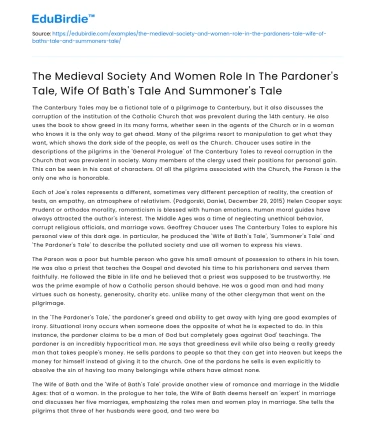The Canterbury Tales may be a fictional tale of a pilgrimage to Canterbury, but it also discusses the corruption of the institution of the Catholic Church that was prevalent during the 14th century. He also uses the book to show greed in its many forms, whether seen in the agents of the Church or in a woman who knows it is the only way to get ahead. Many of the pilgrims resort to manipulation to get what they want, which shows the dark side of the people, as well as the Church. Chaucer uses satire in the descriptions of the pilgrims in the 'General Prologue' of The Canterbury Tales to reveal corruption in the Church that was prevalent in society. Many members of the clergy used their positions for personal gain. This can be seen in his cast of characters. Of all the pilgrims associated with the Church, the Parson is the only one who is honorable.
Each of Joe's roles represents a different, sometimes very different perception of reality, the creation of tests, an empathy, an atmosphere of relativism. (Podgorski, Daniel, December 29, 2015) Helen Cooper says: Prudent or orthodox morality, romanticism is blessed with human emotions. Human moral guides have always attracted the author's interest. The Middle Ages was a time of neglecting unethical behavior, corrupt religious officials, and marriage vows. Geoffrey Chaucer uses The Canterbury Tales to explore his personal view of this dark age. In particular, he produced the 'Wife of Bath's Tale', 'Summoner's Tale' and 'The Pardoner's Tale' to describe the polluted society and use all women to express his views.
Save your time!
We can take care of your essay
- Proper editing and formatting
- Free revision, title page, and bibliography
- Flexible prices and money-back guarantee
The Parson was a poor but humble person who gave his small amount of possession to others in his town. He was also a priest that teaches the Gospel and devoted his time to his parishoners and serves them faithfully. He followed the Bible in life and he believed that a priest was supposed to be trustworthy. He was the prime example of how a Catholic person should behave. He was a good man and had many virtues such as honesty, generosity, charity etc. unlike many of the other clergyman that went on the pilgrimage.
In the 'The Pardoner's Tale,' the pardoner's greed and ability to get away with lying are good examples of irony. Situational irony occurs when someone does the opposite of what he is expected to do. In this instance, the pardoner claims to be a man of God but completely goes against God' teachings. The pardoner is an incredibly hypocritical man. He says that greediness evil while also being a really greedy man that takes people's money. He sells pardons to people so that they can get into Heaven but keeps the money for himself instead of giving it to the church. One of the pardons he sells is even explicitly to absolve the sin of having too many belongings while others have almost none.
The Wife of Bath and the 'Wife of Bath's Tale' provide another view of romance and marriage in the Middle Ages: that of a woman. In the prologue to her tale, the Wife of Bath deems herself an 'expert' in marriage and discusses her five marriages, emphasizing the roles men and women play in marriage. She tells the pilgrims that three of her husbands were good, and two were bad. The three good husbands were rich and old. They loved the Wife of Bath, and, in return, she exerted control over them. The fourth husband had a mistress, or paramour. Out of anger and jealousy, the Wife of Bath was in turn unfaithful.
In my opinion, out of the two of them, The Wife of Bath and the Pardoner, I would have to say that the Pardoner is the worst compared to the Parson. His ability to manipulate people into giving him money while actually keeping it is really bad. It disheartens me to know that people like him existed and still exist in this world. The reason I say that he’s worse then The Wife of Bath is because while she also took advantage of men to get what she wanted, she herself didn’t seem to be a hypocrite, but instead trying to tell other women how to act when she herself didn’t act right.
The pardoner was the farthest away from the Parson to me in terms of attitude and following the teachings of God. Everyone should take note of the Parson, because to God that’s the best way to live and a ticket into heaven.






 Stuck on your essay?
Stuck on your essay?

